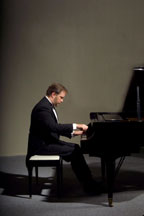
I have begun, in a previous post, to lay out a framework for reasonable faith in the proposition of miracles, with particular focus on the Resurrection. By serendipity or grace, the following address by Rev. Charles Chaput, Archbishop of Denver, showed up recently in First Things:
I’d like to start with a proposition. Here it is: To be a Christian is to believe in history.
All the great world religions have sacred books: the Quran, the Bhagavad-Gita, the Analects of Confucius. What those sacred texts have in common is that they’re essentially wisdom literature. They’re collections of noble teachings aimed at helping believers live ethically and find the right path to peace or happiness or enlightenment.
The Bible also aims to make people wise. But it does much more. It seeks to lead them to salvation, which is much more than enlightenment. The Bible’s starting point is totally different from any other sacred book. The first words are: “In the beginning…” The Bible begins with a step-by-step report of the first day in the history of the world…
Christianity, thus, means believing definite things about history and about our own respective places in history. We don’t just profess belief in the Incarnation. We say we believe that God took flesh at a precise moment in time and in a definite place. Pontius Pilate and Mary are mentioned by name in the creed — and the reference to Mary, his mother, guarantees Christ’s humanity, while the reference to Pilate, who condemned him to death, guarantees his historicity.
All this ensures that we can never reduce the Incarnation to an abstract concept, a metaphor, or a pretty idea. It ensures that we can never regard Jesus Christ as some kind of ideal archetype or mythical figure. He was truly a man and truly God. And once he had a place he called home on this earth. There’s something else, too. We believe that this historical event, which happened more than 2,000 years ago, represents a personal intervention by God “for us men and for our salvation.” God entered history for you and me, for all humanity.
These are extraordinary claims. To be a Christian means believing that you are part of a vast historical project.
The Archbishop’s speech is extraordinary, and I encourage you to read it. It cuts straight to the heart of the Christian faith: the assertion and conviction that it is not merely a belief system, nor simply a framework for morality and wise living, but rather a radical, and historical, event in time. Christianity claims, outrageously, that the eternal God of the universe stepped into time — and the events resulting from this intervention are verifiable in history, not merely believed in the intellect.
The Archbishop stresses, appropriately, this history as detailed in Scripture, and the subject of the historical veracity of Scripture I shall cover at some length in due time. But it may be argued — and has been — that the Scriptures are a hopelessly biased and distorted record, if indeed they are a record at all, of the events detailed in its its pages. Filled with fantastic myths and implausible events, written by zealots, they portray not history but fantasy. If indeed a man named Jesus even existed — and some doubt even this simple premise — we surely know little or nothing of him. Hence the distinction has grown between the “Jesus of history”, of whom we know precious little, and the “Christ of faith” — the spiritual apparition created by zealous followers and true believers, perhaps morally and ethically useful, but surely not based in history and fact.
These are in fact the presuppositions, almost always unspoken, when one hears about the “historical Jesus” today — the assumption that the divine did not intervene in history; that the biblical record is replete with myth, hyperbole, and fabrication; that the Gospel record in particular — especially where it relates miracles or other supernatural events such as the Incarnation and the Resurrection, is simply not to be believed. The moral teachings of Jesus (if he even existed), such as the Sermon on the Mount, may be reasonably accurate of his teaching as a moral agent, but surely anything smacking of the supernatural must be dismissed.
This is invariably the perspective of the mainstream media, manifest in the Time or Newsweek cover story at Easter, supported by media-friendly theological skeptics such as the Jesus Seminar. Consider this from the opening statement of the Jesus Seminar in 1985, a most enlightening summary of the Seminar’s preconditions and assumptions:
… we are having increasing difficulty these days in accepting the biblical account of the creation and of the apocalyptic conclusion in anything like a literal sense. The difficulty just mentioned is connected with a second feature: we now know that narrative accounts of ourselves, our nation, the Western tradition, and the history of the world, are fictions…
Our dilemma is becoming acute: just as the beginning of the created world is receding in geological time before our very eyes, so the future no longer presents itself as naive imminence. … To put the matter bluntly, we are having as much trouble with the middle, the messiah, as we are with the terminal points (creation and Armageddon). What we need is a new fiction that takes as its starting point the central event in the Judeo-Christian drama and reconciles that middle with a new story that reaches beyond old beginnings and endings. In sum, we need a new narrative of Jesus, a new gospel, if you will, that places Jesus differently in the grand scheme, the epic story.
Not any fiction will do. The fiction of the superiority of the Aryan race led to the extermination of six million Jews. The fiction of American superiority prompted the massacre of thousands of Native Americans and the Vietnam War. The fiction of Revelation keeps many common folk in bondage to ignorance and fear.
We require a new, liberating fiction, one that squares with the best knowledge we can now accumulate and one that transcends self-serving ideologies. [Emphasis mine]
Thus we have two competing worldviews on the historical veracity of Christianity: one based in the events and evidence of history, integrated through the window of faith, verifiable in measurable ways by the tools of the historian; and the view of postmodernism, which sees all such “facts” as mere cultural constructs, narratives fomented by the lust for power, to be deconstructed through the eye of skepticism, thus creating a new narrative apropos to our times to free us from the patriarchal tyranny of religious ignorance.
These are the poles, the stark outlines sketched against the canvas of history. There are positions charted out between these extremes, of course, by those who feel cozier in compromise, for whom intellectual sloth seems more virtue than vice. But at its heart, this division comes down to the soul of reason: does truth matter? Is the historical record reliable, and does it in fact point to truth in the area of Christian faith?
For those who are willing to set aside prejudice to judge for themselves, I hope to lay out this history in some limited way. It is, to my eye, compelling — far less as a few definitive “proofs” than a complex mosaic whose lines run in tandem to a single vanishing point at history’s center. As G.K. Chesterton summarizes it in his remarkable work Orthodoxy,”
If I am asked, as a purely intellectual question, why I believe in Christianity, I can only answer, “For the same reason that an intelligent agnostic disbelieves in Christianity.” I believe in it quite rationally upon the evidence. But the evidence in my case, as in that of the intelligent agnostic, is not really in this or that alleged demonstration; it is in an enormous accumulation of small but unanimous facts.
My next post will begin detailing some of these facts, examining the Jesus of the pagans.

 A man who walks into a bar, and sits down on the barstool. He places a large duffel bag on top of the bar.
A man who walks into a bar, and sits down on the barstool. He places a large duffel bag on top of the bar. We’ve been mud-wrestling about
We’ve been mud-wrestling about 
 Courtesy of
Courtesy of